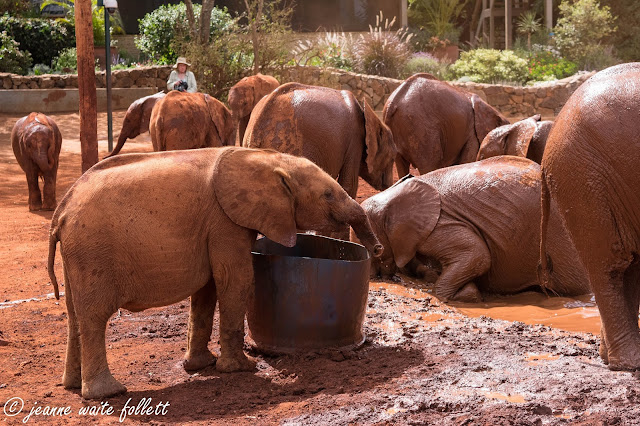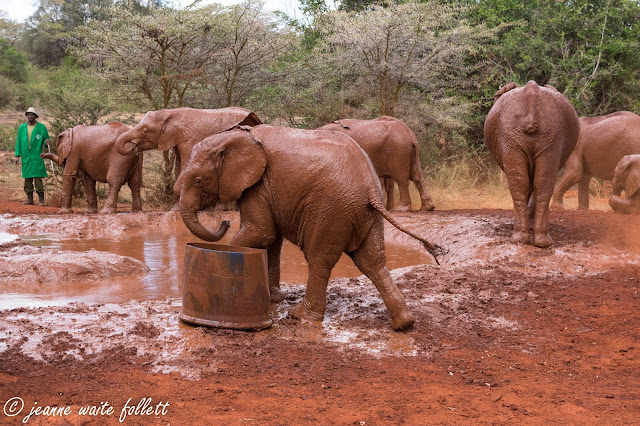This is my last day in Kenya. Late tonight, I will catch a flight homeward
bound. Greg has arranged a busy day for
us in Nairobi, and right now we are going to visit some orphans.
A lot of people visit these youngsters, so Greg signed us up
for a private visit, just the four of us and 23 of them. Good odds for lots of one-on-one
interaction, even though we don’t speak the same language.
We arrive at the appointed time and are escorted to the orphans’
playground. It is simplicity
personified. In the middle of a
clearing is a mud hole filled with rust-colored water, the same color as the iron
rich soil. There’s a small island in
the middle of it.
There are a couple posts planted in the ground and a blue
bucket that holds fresh water. One of
the staff rolls out a wheelbarrow full of bottles with nipples. That’s an awful lot of milk for 23 young
ones!
While I am considering all those bottles of milk, I hear a noise from the left. And here they come, traveling as fast as their feet can carry them!
They are not exactly running, but lumbering along, as it
were, with the rolling gait of elephants.
Yes, elephants. These are
orphaned elephants, and once I get past the awful circumstances of how they
lost their mothers (poaching, human-wildlife conflict, or rejection), and see
how well-adjusted and tended they are, I just take joy in the fact that they
are alive and happy and thriving.
This is the elephant orphanage established by the David Sheldrick Wildlife Trust, founded by Dr. Dame Daphne Sheldrick in memory of her husband. She was the first person to perfect the milk formula and animal husbandry for milk-dependent elephants and rhinos.
The bottles are first.
These babies need their milk every three hours.
 |
| Is this the ellie equivalent of licking your lips? |
When some of them have slurped down the 2.3 liters of milk,
the staff use spades to scoop and throw water on the animals and before long,
the ellies are rolling and splashing and playing in the muddy red water.
A good roll in the dirt completes the daily grooming. When the mud dries, the ellie’s hides will
be protected from sunburn and insects.
A drink of fresh water from the blue bucket tastes good, but it’s sometimes more fun to play with the hose or scratch one’s backside on the bucket itself.
The youngest of the orphans is only a few months old and
stays closer to the people than the other ellies. She is slowly adapting to her new circumstances,
and her keepers keep a close eye on her as she is still in a fragile state. I immediately fall in love with her and she
and I share a special moment or two.
She doesn’t join the others in the mud, afraid they might roll on her.
She, too, was orphaned by poachers.
Another ellie has a large protrusion on her ankle, the
result of being shot while poachers were after her mother.
Education and public awareness, as well as diligent patrols
on the ground and in the air, are used in the fight against poaching. Herders, they say, will often tell the
rangers is they see an orphaned ellie.
Then, our time expired, the ellies follow their keepers back
to the forest, and we wander around the grounds.
Each ellie has its own stall with its name on a placard outside. The floor is covered with clean straw and there is a raised bunk where the keeper sleeps. He will feed the ellie and keep her company throughout the night.
The keepers are rotated often to prevent bonding that might cause problems later when the ellies have been rehabilitated and are ready to be introduced into the wild. That, in itself, is a delicate operation. Sometimes a herd will accept a young ellie; sometimes not.
This transition is done at each individual elephant’s pace
and can take up to ten years. Around 200
orphaned ellies have been hand-raised by the trust, and many calves have been
born in the wild from those successfully re-introduced.
Before we leave the compound, we pay a visit to another of
its denizens.
This is Maxwell, an 11-year-old black rhino born blind and
rejected by its mother. Maxwell, a
friendly little guy who lets you pet him, can never be released into the
wild. He is now a rhino ambassador.












































How tender that was ... a visit to an orphanage on your last day in Kenya. What a way to leave with compassionate memories. The ellies are precious, especially the one who was only a few months old that you were able to commune with up close and personal. Maxwell, the rhino ambassador, ... also precious. No wonder you are eager and ready to return to Africa; you have animal friends there! Smiles and hugs. Patti and Cap
ReplyDeleteI AM WITH Patti on this Post. Wonderful. Fun. A Joy to read and see all of the orphaned ellies. Patti and I have not heard of this abbrevation (ellies) for elephant. Is this a common term that is widely used or is this your special term. Really special Post. Thank You. Cap and Patti
ReplyDeleteEllies is a common term, not just mine. Much easier to say.
DeleteJust went back again to enjoy the up close and personal "chat" you got to have with the youngest ellie. It was just as sweet my second time around! Smiles. Patti
ReplyDeleteHey Jeanne,
ReplyDeleteHow do you remember all of those details?! That sure was a fun trip. We are going back in 9 days and my group and I can hardly wait. Our November, 2018 trip is full. I will be announcing February, 2019 dates next month and hopefully, November, 2019 dates shortly after that...Just in case you are tempted to join us again. :)